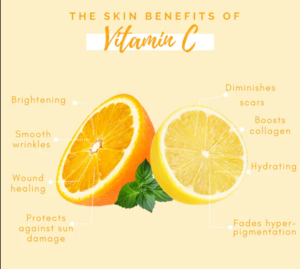
Vitamin C, also known as ascorbic acid, is a powerful antioxidant that offers numerous benefits for the skin when incorporated into your skincare routine. Vitamin C is a potent antioxidant that helps protect the skin from free radical damage caused by UV radiation, pollution, and other environmental stressors. This protection can help slow down the aging process and maintain overall skin health.
Vitamin C plays a crucial role in collagen synthesis, a protein that keeps the skin firm and youthful. By promoting collagen production, vitamin C helps reduce the appearance of fine lines and wrinkles, resulting in a smoother complexion. Vitamin C can help brighten the skin by inhibiting melanin production.
This makes it effective in reducing the appearance of dark spots, sunspots, and uneven skin tone, leading to a more even and radiant complexion. Vitamin C is known for its ability to fade hyperpigmentation, such as post- inflammatory hyperpigmentation (PIH) caused by acne scars or other skin injuries. It can help even out skin tone and reduce the visibility of dark marks. Vitamin C plays a role in the body’s natural wound-healing process. When applied topically, it can help promote the healing of minor wounds, cuts, and blemishes. Vitamin C can help repair and mitigate the effects of sun damage on the skin.

While it should not replace sunscreen, it can complement sun protection measures and aid in the recovery of sun-damaged skin. Vitamin C can enhance the absorption of other skincare ingredients, allowing them to penetrate more deeply into the skin. This can maximize the effectiveness of your skincare products. Vitamin C has hydrating properties and can help the skin retain moisture. It is particularly beneficial for individuals with dry or dehydrated skin. Vitamin C has anti-inflammatory properties, which can be helpful in soothing and calming irritated or red skin. Regular use of vitamin C can help prevent oxidative stress, which can contribute to the formation of fine lines, wrinkles, and other signs of premature aging.
Read Also: Revitalize Skin with Lactic Acid
Various forms of Vitamin C in Skincare Products:
Vitamin C is available in various forms in skincare products, including serums, creams, moisturizers, and masks. When incorporating vitamin C into your skincare routine, it’s essential to use it consistently for optimal results. It’s also important to choose a stable and well- formulated product, store it correctly to prevent oxidation, and use sunscreen daily to protect your skin from UV damage, especially when using vitamin C products. Vitamin C, also known as ascorbic acid, is available in various forms in skincare products to cater to different skin types and concerns. Each form of vitamin C has its unique properties and benefits.
Some common forms of vitamin C used in skincare are:
L-Ascorbic Acid:
L-ascorbic acid is the purest and most potent form of vitamin C. It is highly effective in brightening the skin, reducing the appearance of dark spots and fine lines, and providing antioxidant protection. However, it can be unstable and may oxidize over time, so it’s essential to choose products with proper packaging and storage.
Ascorbyl Palmitate:
Ascorbyl palmitate is a stable and oil-soluble form of vitamin C. It is less potent than L-ascorbic acid but is suitable for individuals with sensitive skin. This form of vitamin C is often used in moisturizers and oil-based skincare products.
Magnesium Ascorbyl Phosphate (MAP):
MAP is a stable form of vitamin C that is water- soluble. It is less potent than L-ascorbic acid but still effective in brightening the skin, reducing hyperpigmentation, and providing antioxidant benefits. MAP is suitable for those with sensitive skin.
Sodium Ascorbyl Phosphate (SAP):
SAP is another stable, water-soluble form of vitamin C. It is gentle on the skin and effective in reducing the appearance of acne scars and blemishes. SAP is often used in serums and spot treatments.
AscorbylGlucoside:
Ascorbyl glucoside is a stable form of vitamin C that is water-soluble. It has brightening and antioxidant properties and is suitable for those with sensitive skin. This form of vitamin C is commonly found in serums and moisturizers.
Read Also: The Power of Beta Hydroxy Acid
Tetrahexyldecyl Ascorbate:
Tetrahexyldecyl ascorbate is an oil-soluble form of vitamin C known for its stability and skin penetration. It provides antioxidant protection and helps reduce the appearance of fine lines and wrinkles. It is often used in facial oils and anti-aging products.
Ethyl Ascorbic Acid:
Ethyl ascorbic acid is a stable and highly effective form of vitamin C. It is known for its skin-brightening and antioxidant properties. This form of vitamin C is used in various skincare products, including serums and creams.
3-O-Ethyl Ascorbic Acid:
This is a stable derivative of vitamin C that can provide antioxidant protection and help even out skin tone. It is often used in serums and anti-aging products.
Vitamin C Derivatives:
Some skincare products contain vitamin C derivatives, which are compounds that convert to vitamin C when applied to the skin. These derivatives can offer various benefits, such as brightening and antioxidant protection.
Importance of Vitamin C to Skin:

Vitamin C, also known as ascorbic acid, holds exceptional importance in skincare due to its multifaceted benefits for the skin. As a powerful antioxidant, it serves as a guardian, shielding the skin from the relentless assault of free radicals and environmental stressors that accelerate premature aging and diminish skin health.
Vitamin C’s efficacy in combating hyperpigmentation, aiding in wound healing, and mitigating sun damage adds to its pivotal role in skincare. Its ability to enhance the absorption of other skincare ingredients amplifies the benefits of complementary products, contributing to overall skin improvement.
Moreover, vitamin C’s soothing and anti-inflammatory properties make it a vital component in calming irritated skin. By fortifying the skin’s defenses, preventing oxidative stress, and providing an extra layer of defense against UV damage, vitamin C emerges as an indispensable ally in achieving and preserving healthier, radiant skin.
Read Also: Flawless Skin: Azelaic Acid Essentials
